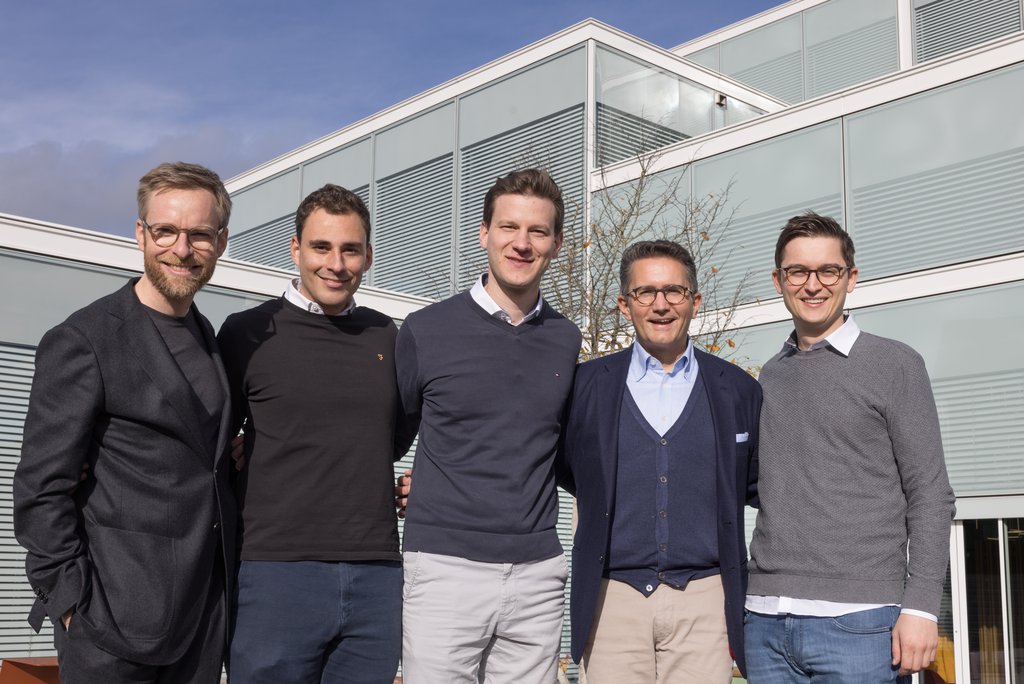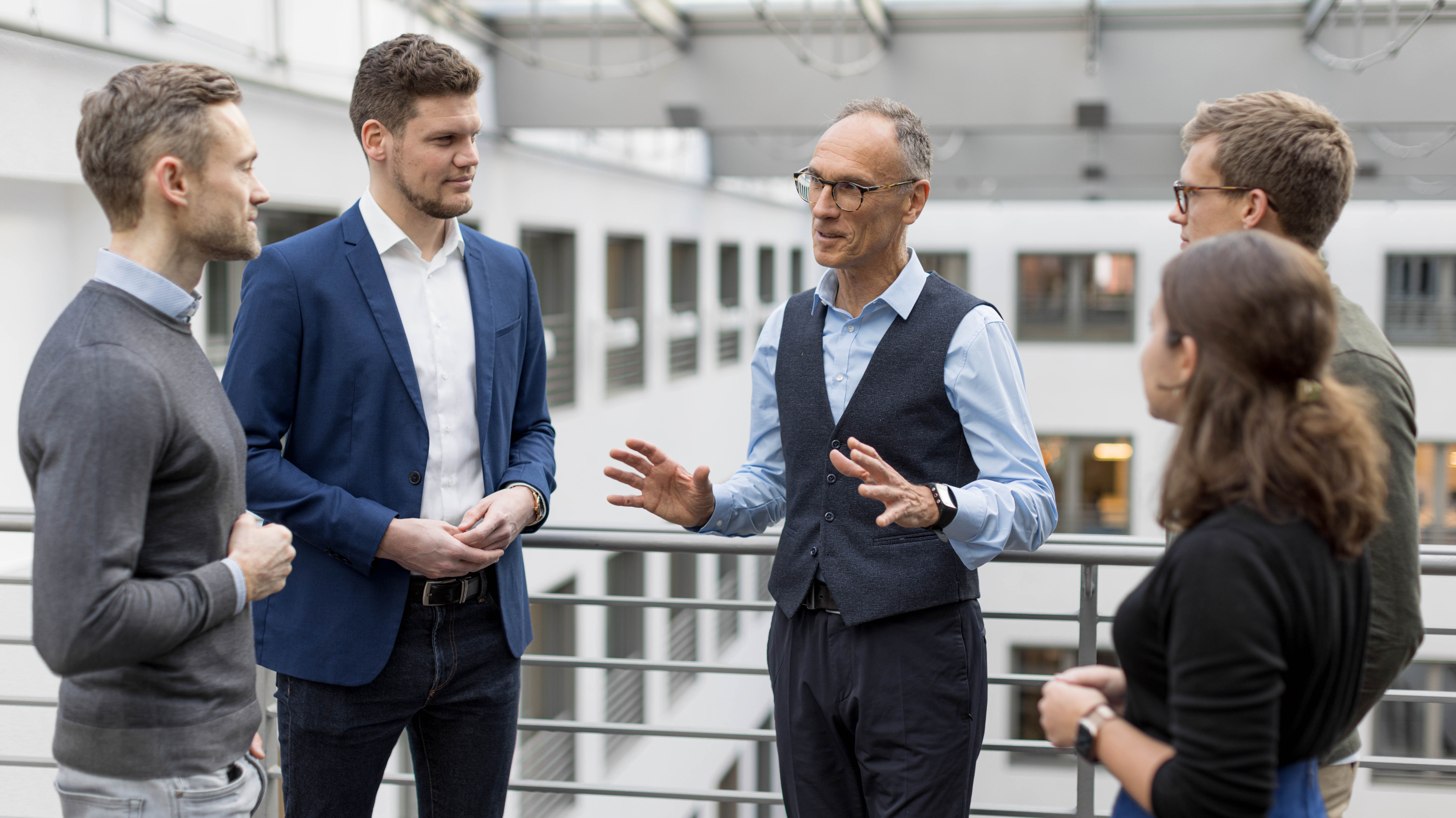Background - 22.11.2022 - 15:19
Chair swap or taster for advanced learners
"Walk a hundred steps in someone else's shoes if you want to understand them", goes a proverb. Translated to the modern working world, it would mean: Swap chairs with another person so you can stay agile and try new ways of doing things. Armchair swapping has become a trend in the transformation-driven world of work. On 21 November 2022, HSG mobility researcher Andreas Herrmann and BCG management consultant Nikolaus Lang swapped chairs and tasks.

Armchair glue, armchair dance, armchair back: The armchair – in addition to our demanding backs – has to hold out for many associations. In order to remain mentally agile in the new working world, armchair swapping is also becoming increasingly popular: two employees, preferably also managers, swap their workplace for a certain period of time and allow themselves to be inspired by the other tasks and approaches.
Agility is the magic word
Leave familiar ways of thinking and try out new approaches: This is what the chair swap can encourage. Because in order to better master the transformation in the world of work, managers must remain agile. "Agility" is the magic word of the new world of work: it stands for high mobility and adaptability and is considered a key competence to react flexibly to changes. This is because the world of work is always in flux: new technological developments, the digital transformation, changing values and expectations of culture and collaboration, as well as a central role for sustainability, present managers and employees with complex challenges. How do they respond to them? Thanks to the armchair swap, managers themselves should become more dynamic, try out new ways and be inspired by the other perspective for their everyday work.
New Work: Armchair Swapping for All
Trying out new roles is a central component of "New Work", a term that describes the working world of the future. By swapping roles, participants should gain more empathy for other activities. In life design, trying out new roles for a limited period of time is called "protoyping". The method is used in particular when there is a desire to change jobs. Professor Sebastian Kernbach heads the Life Design Lab at the HSG and cites the advantages of armchair swapping: "In an armchair swap, you can slip into a different role with little risk, check your own assumptions and thus get a reality check." Communication scientist Kernbach emphasises that armchair swapping in New Work has long since ceased to be a privilege of a few celebrities or executives, but is expected by coming generations as a career development programme: "Younger talents no longer want to work exclusively in one role for several years. Companies now offer institutionalised programmes that enable armchair swapping," says Professor Kernbach. He cites Google's "Bungee Programme" as an example, where employees deliberately take on a different role when their colleagues are absent, for example during family time, in order to gain new perspectives and develop themselves further.

Business person in science
To gain new experiences through a change of perspective and to get to know each other's working world better: this was also the goal of the one-day armchair exchange of Nikolaus Lang and Andreas Herrmann. The consultant at Boston Consulting Group and the Director of the Institute for Mobility (IMO) at the HSG swapped offices and tasks on Monday, 21 November 2022. Lang, a 51-year-old economist, advises companies worldwide on mobility and globalisation issues, heads BCG's functional "Global Advantage" practice group and has been pushing the "Future of Mobility" issue together with the World Economic Forum in recent years.
Lang and Herrmann have been working together for many years; joint projects include "Mobility in the City of the Future" and "Inclusion through Mobility". While working together, the idea came up: "Don't we want to do a job swap?" Nikolaus Lang gave the lecture "Digital Ecosystems" in front of several hundred students during his job swap in the Audimax. The economist was pleasantly surprised that despite the size of the lecture, a lively discussion ensued. He was also surprised by a technical detail: the throwing microphone. "Apparently, students at the HSG not only have to ask smart questions, but they also have to be able to catch the microphone first," Lang says and laughs.
His favourite part of the day, he says, was an intensive strategy session with the entire IMO team, in which Lang discussed the future positioning of the institute with the mobility experts using a mobility map. What is the consultant's conclusion after swapping chairs with Andreas Herrmann? "For me it was a very enriching experience to exchange ideas with the students and discuss strategic perspectives with the IMO team. As a professor, I can support young people who are facing major decisions in their lives in their career choices and define research priorities together. In terms of content, I was particularly attracted by the impressive range of topics at the IMO and the time that is available to devote to an issue in depth," said Nikolaus Lang, who himself studied and did his doctorate at the HSG some 25 years ago.
Guest editor-in-chief and temporary professor
The swapping of chairs between Miriam Meckel and Res Strehle already made headlines ten years ago: In 2013, the two executives swapped chairs for a week: The professor and head of the Institute for Communication Management at the University of St.Gallen headed the editorial office of the Tages-Anzeiger for a week. Res Strehle, then editor-in-chief of the daily newspaper, took over Meckel's lectures and office hours at the university. While Res Strehle enriched the media and communication management lectures with examples from editorial practice and enjoyed the space for theoretical debates with the students, Miriam Meckel immediately put her academic findings from media convergence into practice in everyday editorial work. Conclusion: "Getting a taste" is enriching – for newcomers to the profession as well as for advanced students.
Sabrina Rohner
Caption:
Nikolaus Lang with IMO-HSG team in St.Gallen (Main image: University of St.Gallen (HSG) / Hannes Thalmann)
Andreas Herrmann at BCG in Munich (image: BCG)